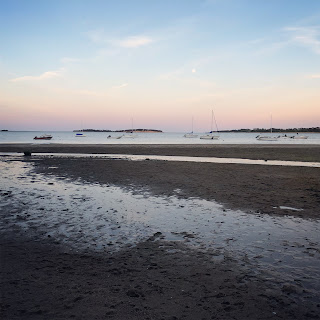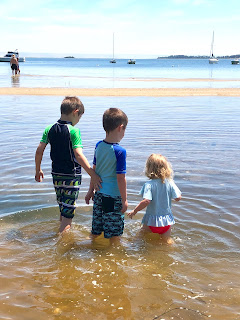Sense of Place
Pleasant Bay, Orleans, MA
But what about setting? Did the author transport you to another time and place, create a backdrop so rich with descriptive imagery that you could picture it without having ever stepped foot there yourself?
Setting is a facet of fiction that is arguably just as important as characters and plot, and yet it is so rarely talked about. As a reader, I've always admired authors who took the time to create a setting so vivid, it almost became another character in the book. Some authors that come to mind are John Steinbeck, whose novel The Grapes of Wrath is peppered with evocative images of the desolate landscape of Dustbowl-era Oklahoma, and Eowyn Ivy's unique ability to conjure the chilling beauty of remote Alaska in The Snow Child.
The initial "seed" that sprouted into my first novel was not a plot point or even a character -- it was a place. Before I'd decided anything at all about my novel, I decided that it would be set on Cape Cod.
To be a New Englander means bonding with people over their beach vacation destination of choice. When you meet a fellow New Englander, you want to know -- are they a Jersey Shore person? A Maine person? Do they head to Block Island, or Misquamicut, or Hampton Beach?
With so very many beautiful spots for beachgoers along the North Atlantic coastline, it always feels special when you meet someone who shares your love for a certain destination, someone who spent their formative years going to the same beaches, the same ice cream shops, fried seafood shacks, and mini-golf places as you did. It's like finding a kindred spirit, someone who immediately understands something about you simply by knowing your "place."
Cape Cod is my "place," and I wanted to depict it in a way that would do it justice, that would speak to both my fellow lovers of Cape Cod, as well as readers who'd never been there but who have their own "place." I wanted the Cape to be more than just a backdrop to my story; I wanted it to be an integral part of the story. I wanted it to feel as though the story couldn't possibly take place anywhere else.
Emily on Pleasant Bay, Summer of 1985
Even within Cape Cod, there are so many different areas, each with its own personality. There's Yarmouth, a popular destination for tourists, with its myriad motels and gimmicky restaurants. There's Welfleet, quiet and sparse and breathtaking. Chatham has an upscale, exclusive feel. Provincetown is progressive and vibrant. Each community has its own vibe, its own unique ambiance, and I love them all. But my absolute favorite part of the Cape, the part that I chose as the primary setting for my novel, is Pleasant Bay.
Pleasant Bay is on the outer "elbow" of the Cape, facing the Atlantic Ocean, but its name is appropriate -- as an inlet, it is sheltered, peaceful, quiet -- pleasant. Many owners of sailboats and small motorboats keep them at moorings in Pleasant Bay, where the calm, shallow waters make for easy access.
My Aunt and her family own a small private beach on Pleasant Bay in South Orleans, and I've been lucky enough to spend time there just about every summer of my life since I was a baby. It's been the backdrop for some many of my happiest memories of family vacations and gatherings. Now, as an adult, I take my own kids there each summer, and the feeling of watching them splash around in those same calm waters that I did as a kid is impossible to describe.
Emily on Pleasant Bay, Summer 1987
When I set out to write a novel set on Cape Cod, and specifically on Pleasant Bay, it was important to me to make the setting more than just an incidental part of the story. I didn't want it to be a story that could take place in Any Random Beach Town, USA. I wanted to transport my readers there, to make this place that I love so much come alive for my readers.
Writers of fiction inevitably sprinkle pieces of themselves throughout their work -- it's something that can't be completely avoided. After all, imagination is the product of what we've seen, where we've been, who we've met -- who we are. Anyone who knows me will likely find tiny fragments of me in my characters, and even to some extent in the plot. But the biggest piece of myself that I wanted to impart is the Cape Cod piece. Because, for all of the other things this book is -- a story of mothers and daughters, a story of love lost and found -- it is, at its core, a love letter to Cape Cod.







That is amazing. My "place" is York Beach, Maine. This makes me want to take a trip and visit Cape Cod, I've never been!
ReplyDelete